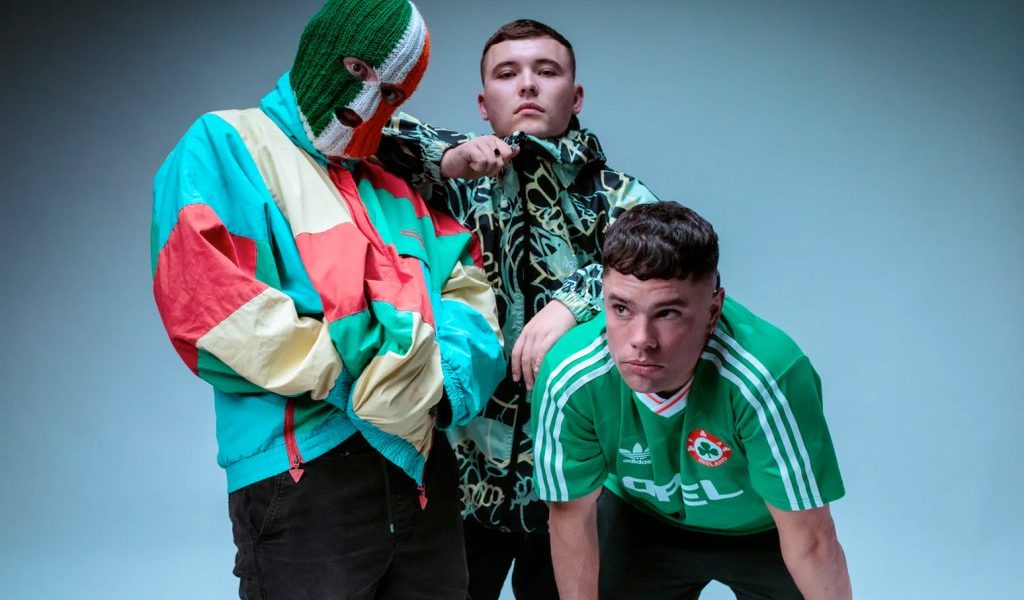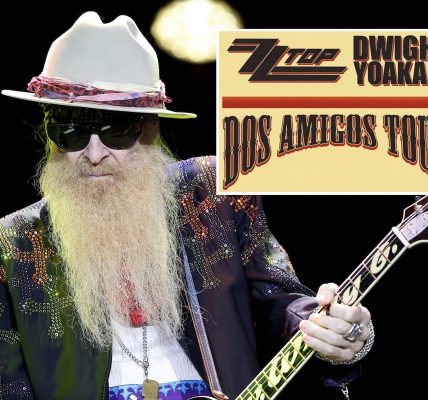Sharon Osbourne has expressed her strong opposition to the Northern Irish hip-hop group Kneecap, criticizing their provocative messages during their recent performance at Coachella. She has gone so far as to advocate for the cancellation of their work visas, highlighting her concerns over the influence of their politically charged content.
On April 22, Sharon Osbourne took to social media to voice her opinion regarding Kneecap, just days after the group performed at the second weekend of the Coachella festival. Their performance on April 18 garnered significant attention due to the band’s bold expressions of anti-Israel sentiments, which they claimed were initially censored during their first weekend appearance. The controversy surrounding their messaging has sparked widespread discussions about the intersection of music and politics.
The messages displayed during Kneecap’s performance included provocative statements such as, “Israel is committing genocide against the Palestinian people.” The projections further stated, “It is being enabled by the U.S. government who arm and fund Israel despite their war crimes. F–k Israel; free Palestine.” These statements not only reflect the band’s political stance but also emphasize the contentious atmosphere surrounding their performance, igniting debates about freedom of expression in music.
The 2025 edition of Coachella saw a variety of pro-Palestinian sentiments expressed by multiple artists. For instance, Green Day modified their lyrics to draw attention to the struggles faced by Palestinian children, while artists like Bob Vylan and Blonde Redhead showcased Palestinian flags during their sets. Notably, the performance of Blonde Redhead was accompanied by audio clips of Mahmoud Khalil, a detained Columbia University graduate student, currently held in an immigration detention center due to his participation in protests.
Sharon Osbourne’s response to the politicization of Coachella was extensive, as she expressed concerns that this year’s festival would be remembered as one that compromised its moral and spiritual integrity. Her critique raises important questions about the role of music festivals in addressing or avoiding political issues.
According to Osbourne, “Goldenvoice,” the festival organizer, contributed to this issue by allowing artists to utilize the Coachella platform for political messages. She emphasized that during times of global unrest, music should serve as an escape rather than a stage for political discussions. This sentiment resonates with many who believe that music should unite rather than divide.
Osbourne conveyed that, while festivals like Coachella highlight incredible talent from around the globe, the essence of music is to bring people together. She firmly stated that the festival should not serve as a venue for endorsing terrorism or spreading messages of hate. This perspective reinforces the need for artists and event organizers to carefully consider the implications of their political expressions.
As she continued her argument, Osbourne expressed her admiration for Green Day, acknowledging her appreciation for their music. However, she suggested that their perspectives on the Middle East should be shared at their own concerts rather than during a festival setting. Osbourne found Kneecap’s messages particularly troubling, ultimately calling for the revocation of their work visa.
Osbourne described Kneecap as an Irish rap group that elevated their performance with aggressive political statements. She expressed concern over their use of anti-Israel projections and what she labeled as hate speech, claiming that the group openly supports terrorist organizations. This characterization prompts further discussion about the responsibility artists bear for the messages they promote during public performances.
Osbourne’s concerns extend to the implications of Kneecap’s participation in a festival like Coachella, questioning the appropriateness of their presence given their controversial messages. Reports suggest that Goldenvoice was not aware of Kneecap’s political agenda when booking them. However, their decision to allow the group to perform again after their first weekend raises questions about the festival’s endorsement of their rhetoric and the due diligence exercised during the booking process.
In the aftermath of Kneecap’s performance, Goldenvoice CEO Paul Tollett reportedly stated that he felt “blindsided” by the band’s actions. In contrast, HYBE America CEO and former talent manager Scooter Braun, who previously organized events in Los Angeles and Israel focusing on the October 7, 2023 attacks, defended Tollett. Osbourne expressed disbelief that those familiar with Braun’s work could book an artist like Kneecap for the festival without considering the potential backlash.
Osbourne also pointed out that the Independent Artists Group, which represents Kneecap, includes members of Jewish heritage. She expressed disappointment that they have not leveraged their influence to prevent the dissemination of such controversial messages. Her remarks underline the intricate dynamics within the industry and the responsibilities that come with representation.
Sharing her personal background, Osbourne stated, “As someone with both Irish Catholic heritage on my mother’s side and Ashkenazi Jewish heritage on my father’s side, along with extensive experience in the music industry, I understand the complexities involved.” She challenged Goldenvoice’s claim of being “blindsided” by Kneecap’s performance, noting that several individuals in the industry had previously voiced concerns regarding the booking of the group.
Despite the backlash, Kneecap has not issued a direct response to the criticism directed at their messaging. Instead, they have shared instances of supportive messages they have received following their sets at Coachella. Looking ahead, the group is set to return to North America in October for a new series of live performances.

Discover More Information Here





